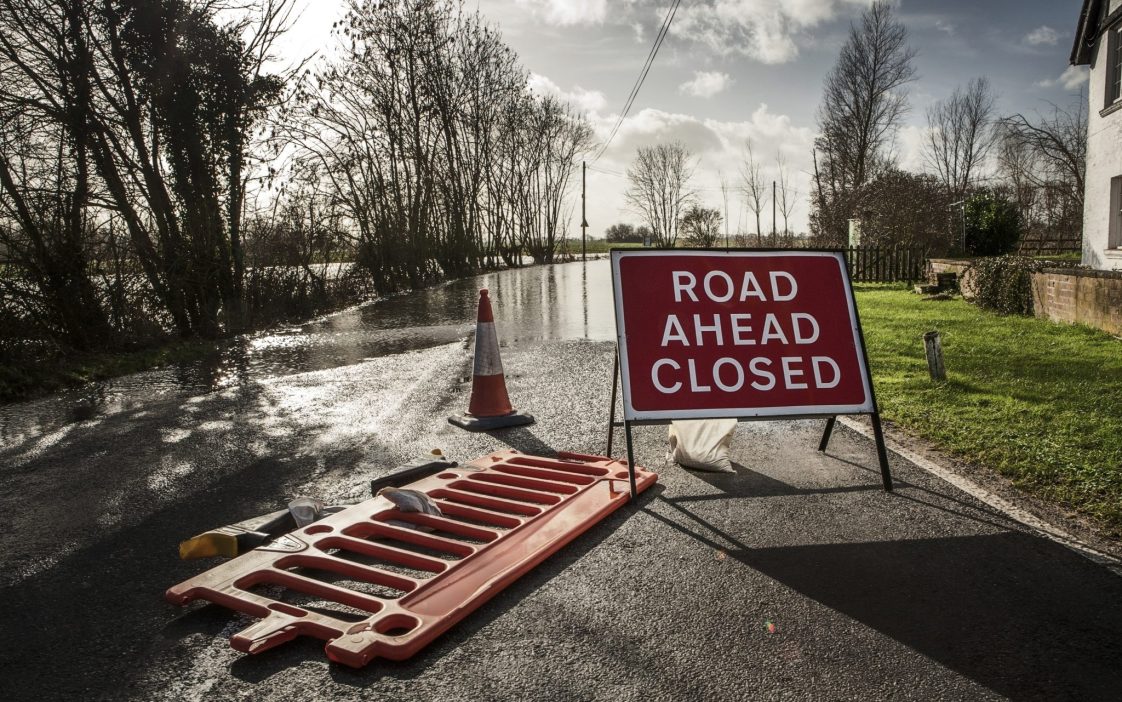Emergency Handbook

When natural disasters strike, you must take care of yourself and your family first. There are serious problems to deal with before recovery begins. Illness or injury may result from contaminated water, debris-filled roadways, electrical and fire hazards, and displaced wildlife.
- Follow public announcements and obey official orders. Local authorities will provide valuable information about road closings and the safety of tap water for cooking and bathing. If the water is not safe, they will tell you to use bottled water or to boil and disinfect tap water.
- Avoid flooded areas. Follow all warnings about water on roadways. Never go around a police barricade. In flooded areas, washouts may have weakened roads and bridges, and they could collapse under the weight of your vehicle. If you have to work in or near floodwater, wear a life jacket.
- Wear protective clothing. When working, wear a hard hat, goggles, heavy work gloves, and watertight boots with steel toes and insoles (not just steel shanks). Protective clothing is especially important when handling chain saws and other large pieces of equipment used in clearing debris.
- Avoid unstable buildings. Be careful around damaged buildings and trees. Leave immediately if you hear shifting or unusual noises that signal the structure may fall.
- Stay alert of electrical and fire hazards. Never touch any building, car, or other structure that has a fallen power line touching it. Avoid contact with overhead power lines during cleanup and other activities. Do not burn candles near flammable items or leave candles unattended. If possible, use flashlights or other battery-operated lights instead of candles. Call a professional electrician or power company to report a down power line or power outage.
- Beware of gas leaks. Avoid using flames or sparking devices until you are sure there is no natural gas leaking in the area. Natural gas leaks are the top cause of fires after a disaster. That is why you never turn gas back on by yourself. Contact your local utility company for a trained professional to restore your gas service.
- Prevent carbon monoxide poisoning. Carbon monoxide is an odorless, colorless gas produced by many types of equipment. It is poisonous to breathe . Do not use a portable generator, charcoal grill, camp stove and/or other gasoline and charcoal burning device in any enclosed or partially enclosed area, even if the area has ventilation. Opening doors and windows or using fans will not prevent carbon monoxide from building up in the home. If you start to feel sick, dizzy, or weak while using a generator or other gasoline/charcoal burning device, ge to fresh air right away. Seek prompt medical care.
- Store and transport gasoline safely. Always transport gasoline in an approved safety container. Approved containers are red and have a warning label regarding the dangers of gasoline. Do not use a glass container or a used metal container that has held other petroleum products. Gasoline is highly flammable and extremely dangerous, so take all necessary precautions when handling it. Fill approved containers to only 95 percent capacity to allow for heat expansion. Before loading a filled, portable gasoline container into a vehicle, make sure that the cap and the air vent cap are tight. Secure the container so it doesn’t tip while being transported.
- Use chain saws safely. Wear protective gear, including a helmet consisting of head, face, and hearing protection. You also need cotton or leather gloves, protective chaps, and boots with steel toes. Read your owner’s manual concerning kickback danger of the chain saw to reduce your risk of injury. Remember always to hold the chain saw firmly with both hands and do not overreach or cut above shoulder height. Follow sharpening and maintenance instructions for the chain saw and only fill a gas-powered chain saw when the engine is cool. If the saw runs out of gas, let it cool 30 minutes before refueling.

- Avoid wild or stray animals. Wildlife often finds refuge in structures damaged in a storm because they provide easy access. Be aware of your surroundings and avoid wild or stray animals. Call local authorities, who are better equipped to handle live animals and can dispose of dead animals according to local guidelines.
- Beware of snakes. Wear snake-proof boots that are at least 10 inches high or wear snake leggings in heavy debris areas. This is where snakes are likely to be found. Use a long stick to announce your approach when possible. If you are bitten by a snake, don’t try to treat the bite yourself. Go immediately to the nearest hospital or place of treatment. It helps to note the appearance of the snake for identification and treatment purposes.
- Pace yourself and get support. Watch for signs of physical and emotional exhaustion or strain. Learn to recognize and deal with stress. Set priorities for cleanup tasks. Try not to work alone. Ask family members, friends, or professionals for support.
- Work smart. Use teams of two or more people to move bulky objects. Avoid lifting any material that weighs more than 50 pounds (per person). When lifting hevy debris, bend your knees and lift with your legs, not your back.
- Prevent mosquito bites. Wear long pants, socks, and long-sleeved shirts. Use insect repellents that contain DEET or picaridin.
- Apply sunscreen. When working outside for extended periods of time, use sunscreen with a minimum of SPF 30.
- Treat wounds. If you get a scratch, cut, or brush burn, clean it with soap and clean water. Apply an antibiotic ointment. Seek medical attention immediately if a wound swells or drains, and if you have not had a tetanus booster in the last few years.

Emotional Responses to Disasters
When you experience a disaster or other stressful event, you can have a variety of reactions, all of which can be common responses to difficult situations.
- feeling physically and mentally drained
- having difficulty making decisions or staying focused
- becoming frustrated easily
- arguing more
- feeling tired, sad, numb, lonely, or worried
- experiencing change in appetite or sleep patterns
Most of these are temporary. Try to accept whatever reactions you may have. Look for ways to take one step at a time and focus on taking care of your disaster-related needs.
Used by permission of Texas A&M AgriLife Extension Service.
Use pesticides only according to the directions on the label. Follow all directions, precautions, and restrictions that are listed. Do not use pesticides on plants that are not listed on the label. Trade and brand names used are given for information purposes only. No guarantee, endorsement, or discrimination among comparable products is intended or implied by the Alabama Cooperative Extension System. This publication is for information purposes only and should not be a substitute for recommendations or treatment by a health care provider.

